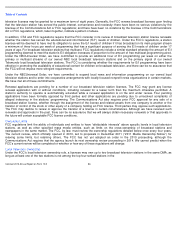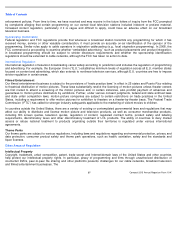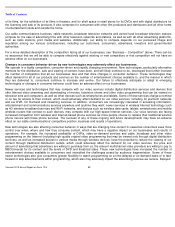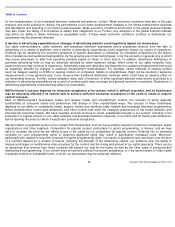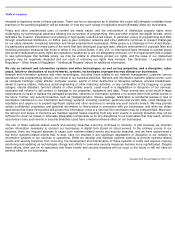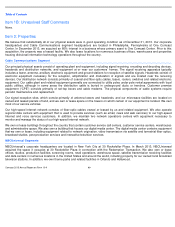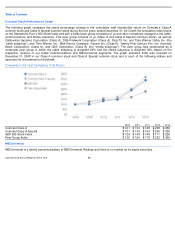Comcast 2013 Annual Report Download - page 39
Download and view the complete annual report
Please find page 39 of the 2013 Comcast annual report below. You can navigate through the pages in the report by either clicking on the pages listed below, or by using the keyword search tool below to find specific information within the annual report.
Table of Contents
park operations. In addition, we are subject to the NBCUniversal Order and the NBCUniversal Consent Decree, which have
imposed numerous conditions on our businesses relating to the treatment of competitors and other matters. Failure to comply with
the laws and regulations applicable to our businesses could result in administrative enforcement actions, fines, and civil and
criminal liability.
Legislators and regulators at all levels of government frequently consider changing, and sometimes do change, existing statutes,
rules, regulations, or interpretations thereof, or prescribe new ones, which may significantly affect our businesses. Any future
legislative, judicial, regulatory or administrative actions may increase our costs or impose additional restrictions on our businesses,
which could adversely affect our businesses. For example, in 2010, the FCC adopted
“open Internet”
regulations applicable to
broadband Internet service providers (“ISPs”).
The regulations required broadband ISPs such as us to disclose information
regarding network management, performance and commercial terms of the service (the “transparency rule”);
barred broadband
ISPs from blocking access to lawful content, applications, services or non-
harmful devices; and barred wireline broadband ISPs
such as us from unreasonably discriminating in transmitting lawful network traffic. The no-blocking and non-
discrimination
requirements allowed for reasonable network management. The FCC did not prohibit speed tiers or usage-
based pricing, but
specifically noted that “paid prioritization” (
i.e., charging content, application and service providers for prioritizing their traffic over
our last-mile facilities) or an ISP’
s prioritizing of its own Internet content likely would violate these regulations. In January 2014, the
U.S. Court of Appeals for the D.C. Circuit vacated all of the FCC’
s rules except for the transparency rule but the court clarified that
the FCC had the fundamental authority to regulate broadband Internet access services as a general matter. Although we remain
bound by the FCC’s original “open Internet”
regulations as a condition of the NBCUniversal Order and the NBCUniversal Consent
Decree for the remainder of the term of those orders, it is possible that the FCC may appeal the court’
s decision or seek to adopt
new Internet regulations or take other actions that restrict the manner in which we and other ISPs provide Internet services. The
FCC also may attempt to reclassify broadband Internet service as a “telecommunications service,”
which would authorize the FCC
to subject it to traditional common carriage regulation under Title II of the Communications Act. Under a Title II framework, the FCC
could potentially regulate our customer rates for broadband Internet services and could prohibit or seriously restrict arrangements
between us and Internet content, application, and service providers, including backbone connection arrangements. These
arrangements historically have not been regulated by the FCC. The FCC Chairman, however, has stressed that the FCC has a
responsibility to ensure “connectivity”
of the Internet, and although he has made clear that he does not consider peering and transit
arrangements to be an “open Internet”
issue, he considers it a related issue that the FCC, at a minimum, should monitor. The FCC
might also take a broader view of its existing authority, as confirmed by the court decision, to adopt any regulation that conceivably
would promote broadband deployment and adoption so long as it is not a common carrier regulation, and states may also attempt
to regulate the Internet pursuant to the court’
s decision. We cannot predict what, if any, proposals might be adopted or what effect
they might have on our business. For a more extensive discussion of the significant risks associated with the regulation of all of our
businesses, see “Business – Legislation and Regulation” above.
Weak economic conditions may have a negative impact on our businesses.
A substantial portion of our revenue comes from customers whose spending patterns may be affected by prevailing economic
conditions. Weak economic conditions, or increases in price levels generally due to inflationary pressures, could adversely affect
demand for any of our products and services and have a negative impact on our results of operations. For example, customers may
reduce the level of cable services to which they subscribe, or may discontinue subscribing to one or more of our cable services.
This risk may be increased by the expanded availability of free or lower cost competitive services, such as Internet video streaming
and downloading services, or substitute services, such as mobile phones, smartphones and Wi-
Fi networks. Weak economic
conditions also may have a negative impact on the advertising revenue of our cable communications, cable networks and
broadcast television businesses. Weak economic conditions could also reduce the fees that multichannel video providers pay for
our cable networks’ programming and
Comcast 2013 Annual Report on Form 10
-
K
34


